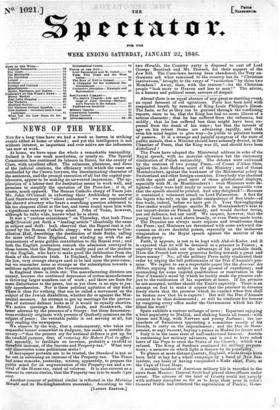NEWS OF THE WEEK.
NOT for a lens, time have we had a week so barren in striking events either at home or abroad ; and yet the intelligence is not without interest, so important and ever active are the influences 'list now at work.
At home' we have upon the whole a remarkable tranquillity. Ireland is for one week murderless, or nearly so. The Special Commission has continued its labours in Ennis, for the county of Clare, with excellent effect. The calmness, plainness, and force of the judicial orations, the efficiency with which the cases are conducted by the Crown lawyers, the discriminating character of the sentences, and the prompt execution of all but the capital pun- ishments, appear to be making an unwonted impression. The ap- plication of a labour-test for destitution seems to work well, and promises to simplify the operation of the Poor-law : it is, of course, much opposed. The Roman Catholic clergy of Tuam join Mr. John O'Connell in exhorting their Archbishop to answer Lord Shrewsbury with "silent contempt" : we are reminded of the shrewd attorney who hears a searching question addressed to his too eloquent client at the bar, and turns round upon him with a significant entreaty to keep silent. John of Tuam, however, although he talks wide, knows what he is about.
It was a "curious coincidence" on Thursday, that both Times andiChroniele put forth a "leading article" identically the same in subject and drift: both observed that the Repeal rent is col- lected by the Roman Catholic clergy; who send letters to Con- ciliation Hall, describing the destitution of their flocks, calling for more relief from England, and winding up with the an- nouncement of some golden contribution to the Repeal rent ; and both the English journalists remark the admission conveyed in these letters, that the Repeal rent is really paid out of the pockets of the English, who have to make good the defalcation from the funds of the destitute Irish. In England, before the reform of the law, very strange charges used to be laid upon the poor-rates; but we remember none so strange as the subscription towards a seditious agitation against the Government.
In England there is little stir. The manufacturing districts are uneasy, because the continued depression of cotton-manufactures is throwing larger numbers out of work ; and there are fears for some disturbance to the peace, but as yet there is no sign to jus- tify apprehension. Nor is there political agitation of any kind. There is thus far nothing that can be called a movement on the subject of the Jewish disabilities, whether for or against the Min- isterial measure. An attempt to get up meetings for the preven- tion of national defence looks as if it would be equally abortive. We notice meetings in Bristol, Leeds, and Southwark, the latter adorned by the presence of a Sturge : but these demonstra- tions evidently originate with persons of Quakerly opinions on the subject of peace ; the veritable public is not moving at all, but only reading the newspapers.
We observe by the way, that a contemporary, who takes our respectful banter somewhat in dudgeon, has made a notable dis- covery—" that the present cry for national defence is got up for the twofold purpose, first, of restoring Sir Robert Peel to office ! and secondly, to facilitate an increase, probably a twofold or threefold increase, of the Income and Property-tax." What very odd discoveries some politicians make !
If newspaper portents are to be trusted, the Standard is not so far out in surmising an increase of the Property-tax. The Times had some remarks, yesterday, written, apparently, to prepare the public mind for an augmentation of the Property-tax and a re- vival of the House-tax, rated ad valorem. It is also current as a rumour in certain circles, that the Property-tax is to be made 5 per cent.
Another rumour of political circles is reflected in the Morning Herald and its Buckinghamshire namesake. According to the
two Heralds, the Country party is disposed to cast off Lord George Bentinck and Mr. Disraeli, for their support of the Jew Bill. The Corn-laws having been abandoned, the Tory en- thusiasts ask what remained to the country but its "Christian institutions," brought to the verge of "extinction" by those two Members? Away, then, with the traitors !—let the Christian people "look more to Heaven and less to men !" The advice, in a human and political sense, savours of despair.


























